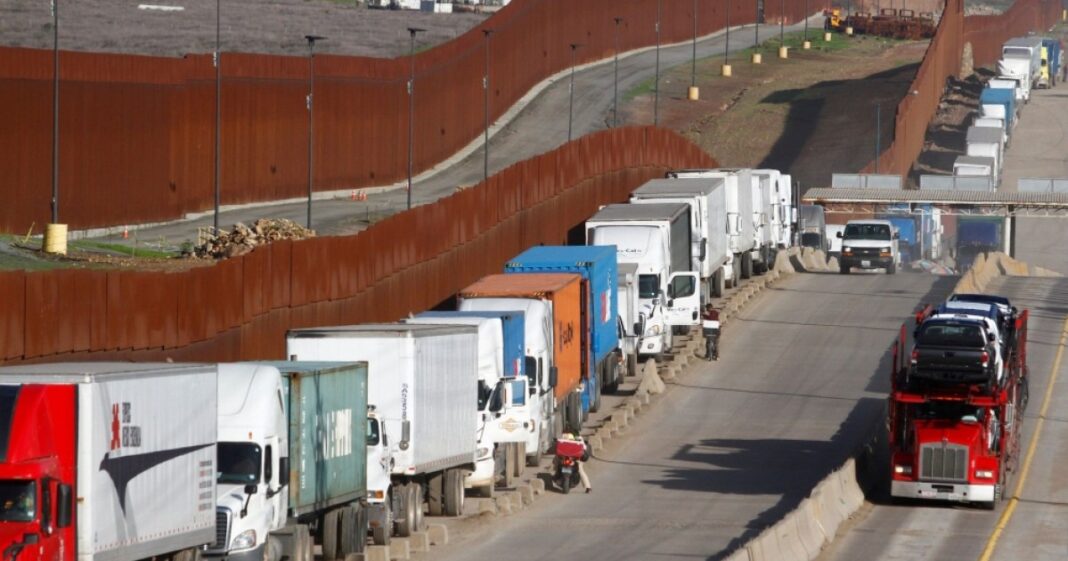As United States President Donald Trump barrels forward with tariff threats against key trading partners Canada and Mexico, a renegotiation of the three countries’ trade agreement could be in the offing.
In his first term as president, Trump pushed to replace the North American Free Trade Agreement with the current United States-Mexico-Canada Agreement, or USMCA.
Under Trump’s leadership, the US added a clause, Article 34.7, which requires a joint review of the pact within six years, a deadline that lands on July 1, 2026.
The agreement also includes a sunset clause to render the pact void by 2036 in the case of nonrenewal and a mandatory consultation with American stakeholders that is due to start in October.
While the USMCA does not include much detail on what that review would look like, it appears likely that Trump wants to rewrite the agreement entirely, said Vina Nadjibulla, vice president of research and strategy at the Asia Pacific Foundation of Canada,
“President Trump’s tariff threat and his overall language and tone of coercion toward Canada has everyone in agreement that he does want to see USMCA fully renegotiated and much sooner than July 2026 or even October,” Nadjibulla told Al Jazeera.
The Trump administration is seeking to rewrite numerous trade rules to extract concessions from other countries, boost domestic production and increase government revenues.
Trump’s threats have caused particular consternation in Canada and Mexico, which are now facing the prospect of three rounds of tariffs.
After threatening the neighbouring countries with 25 percent across-the-board tariffs over their alleged failure to stem the flow of drugs and undocumented migrants across US borders – measures that have since been suspended until March 4 – Trump this week announced plans for reciprocal tariffs on countries that impose levies on US goods and tariffs on all steel and aluminium imports.
“Arguably, negotiating the USMCA might be a way to address a wide set of the issues, including the steel and aluminum concerns, but it won’t be easy,” Rachel Ziemba, an economist at the Center for a New American Security who focuses on geopolitical and macro risks, told Al Jazeera.
The goal for Trump, economist Stephen Brown said, will be to further improve the terms for US businesses. Brown, deputy chief for North America at Capital Economics, expects several key changes to the USMCA, including to the “rules of origin”.
Currently, to qualify for duty-free trade, the USMCA stipulates, for example, that 75 percent of the components in a vehicle must be produced in North America. In a renegotiated pact, that share could potentially be raised or altered to exclude any components produced in certain countries, such as China.
Brown also expects the US to add similar rules for other high-tech sectors like aerospace and for the USMCA review to push for an increase in market share for US businesses.
Mexico and Canada still restrict market access to US firms in certain sectors, Brown said, such as agricultural products and banking and telecommunications.
The US probably wants these restrictions loosened, he said.
Fork in the road
One question is how Canada and Mexico will move forward.
Will they deepen their trade with the US, or if they’re concerned that might come at a cost to their sovereignty, will they choose to diversify away from the US?
“Canada and Mexico are on the front line of managing Trump’s new trade war. It was China that was supposed to be, but it’s not. Trump has not been differentiating between friends and foes,” Nadjibulla said, adding that China will increasingly dominate the agenda outside trade as well given issues such as the legal status of TikTok and the war in Ukraine.
While some Canadian observers hope that revisiting the USMCA might place the other tariff threats in abeyance, Ziemba said this is far from assured.
“But ultimately, Trump may be swayed by negative market pressure and that from business in the US, including manufacturers and construction, who will face higher costs,” she said.
For now, in Canada at least, the threats from across the border are fuelling calls to “buy Canadian” and lessen reliance on the US market.
But there is an economic cost to that kind of independence, Nadjibulla warned, adding that Ottawa will likely face “that fork in the road” within a few months.







